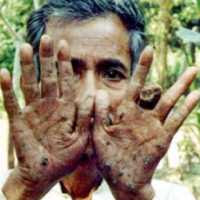The Rise of Tubewells
In the early 1970's Bengali people obtained a majority of
 their drinking water by dipping into ponds, rivers, and hand-dug wells. This water however contained bacteria that caused infection and disease, such as cholera, to spread throughout Bangladesh. With such devastating outbreaks, relief agencies such as the United Nations Children's Fund, the World Bank, and Britain's Overseas Development Administration stepped in to lend a hand by providing millions of pounds of tubewells to Bangladesh. Tubewells are steel pipes fitted with simple hand pumps that allow individuals to reach plentiful amounts of supposedly clean and safe drinking water from the Ganges floodplain. According to the World Health Organization, there are over 3 million tubewells in use today, providing 95% of all drinking water in Bangladesh.
their drinking water by dipping into ponds, rivers, and hand-dug wells. This water however contained bacteria that caused infection and disease, such as cholera, to spread throughout Bangladesh. With such devastating outbreaks, relief agencies such as the United Nations Children's Fund, the World Bank, and Britain's Overseas Development Administration stepped in to lend a hand by providing millions of pounds of tubewells to Bangladesh. Tubewells are steel pipes fitted with simple hand pumps that allow individuals to reach plentiful amounts of supposedly clean and safe drinking water from the Ganges floodplain. According to the World Health Organization, there are over 3 million tubewells in use today, providing 95% of all drinking water in Bangladesh.History's Largest Poisoning - Arsenic Contamination
A couple decades after millions of tubewells were implemented in Bangladesh, millions of Bengali citizens began developing debilitating marks on their skin such as melanomas on chest and hands; white skin blotches known as leukomelanosis; keratosis, painful warts that begin
 on palms and soles and gradually cover the body; acute conjunctivitis and breathing difficulties. These symptoms were found to be the result of arsenic poising. Millions of innocent people had been poisoned by arsenic, but how? After implementing tubewells in Bangladesh, no one bothered to test the waters for contamination until just recently. Results from such tests show that several tubewells contain water that has arsenic levels of 50 ppb; which is 5 times the amount considered acceptable by the World Health Organization. It appears as though arsenic is abundant in the very fine alluvial sediments of the Ganges Delta, and tubewells pumped 20-100 meters into the ground hit these arsenic abundant regions. Unfortunately, the Bangladesh government attempts to ignore this issue and continues installing tubewells.
on palms and soles and gradually cover the body; acute conjunctivitis and breathing difficulties. These symptoms were found to be the result of arsenic poising. Millions of innocent people had been poisoned by arsenic, but how? After implementing tubewells in Bangladesh, no one bothered to test the waters for contamination until just recently. Results from such tests show that several tubewells contain water that has arsenic levels of 50 ppb; which is 5 times the amount considered acceptable by the World Health Organization. It appears as though arsenic is abundant in the very fine alluvial sediments of the Ganges Delta, and tubewells pumped 20-100 meters into the ground hit these arsenic abundant regions. Unfortunately, the Bangladesh government attempts to ignore this issue and continues installing tubewells.How can this be stopped?
- Declaring a public health emergency - this would facilitate the rapid allocation of funding and prompt expansion of intervention, as stated by the World Health Organization.
- Candle filtration systems - These are easy to use if maintained. These units are designed to be attached to tubewells in order to remove arsenic. However, the filters must be disposed of when they reach maximum arsenic capacity or else they will no longer work properly as filters.
- Providing chemicals to daily remove arsenic from drinking water -this method is very simple, feasible, and cheap. Small packets would be distributed with instructions to mix chemicals with arsenic contaminated water and let stand overnight. However, citizens may not use the chemicals and/or they may not dispose of the sludge byproducts properly.
- Use surface water - Water treatment plants would need to be developed and maintained in order to purify surface water.
- Close highly contaminated wells - This seems like the most likely option. Yet, 4 out of 5 of each tubewell is privately owned. It would also be very time conuming and challenging to test over 3 million tubewells for contamination.
Why is it that countries like the U.S. have plenty of clean/"safe" water to drink, bath in, and waste (swimming pools, water lawns, etc...) when other countries don't have enough clean water to survive?
As discussed in CES 301, this becomes an issue relating to human rights vs. commodities and globalization. Simply because America is a country of power does not give us more rights to water resources and other countries. It also does not give us the right to be ignorant to the needs of other countries and people. If we have the technology and access to safe water in enough abundance to "waste" it, then why are we not taking advantage of globalization and possibilities of shipping water to other locations. People who are forced to pay 12-87 times more for water than necessary would benefit from this additional supply of water.
However, in order to bring good to this situation, we being a country of power, must not exploit countries like Bangladesh if we are to export water resources to them. They have the same rights to clean drinking water as anyone else. The power struggles that have caused us to fight for rights to resources should not inhibit us from providing water resources to other countries. Water is not a resource that individuals or countries should have the rights to. Water is a resources needed by everyone and everyone should have equal human rights to clean water.
If you are interested in helping citizens of Bangladesh who are currently struggling from arsenic poising and lack of water here are a few sites through which you can provide assistance:
- http://www.hopeforbangladesh.org/
- http://www.wateraidamerica.org/what_we_do/where_we_work/bangladesh/default.aspx?gclid=CPPWi57WtKACFRkcawodsCFQUA/
- http://water.org/
Click HERE to open the feedback tool.

